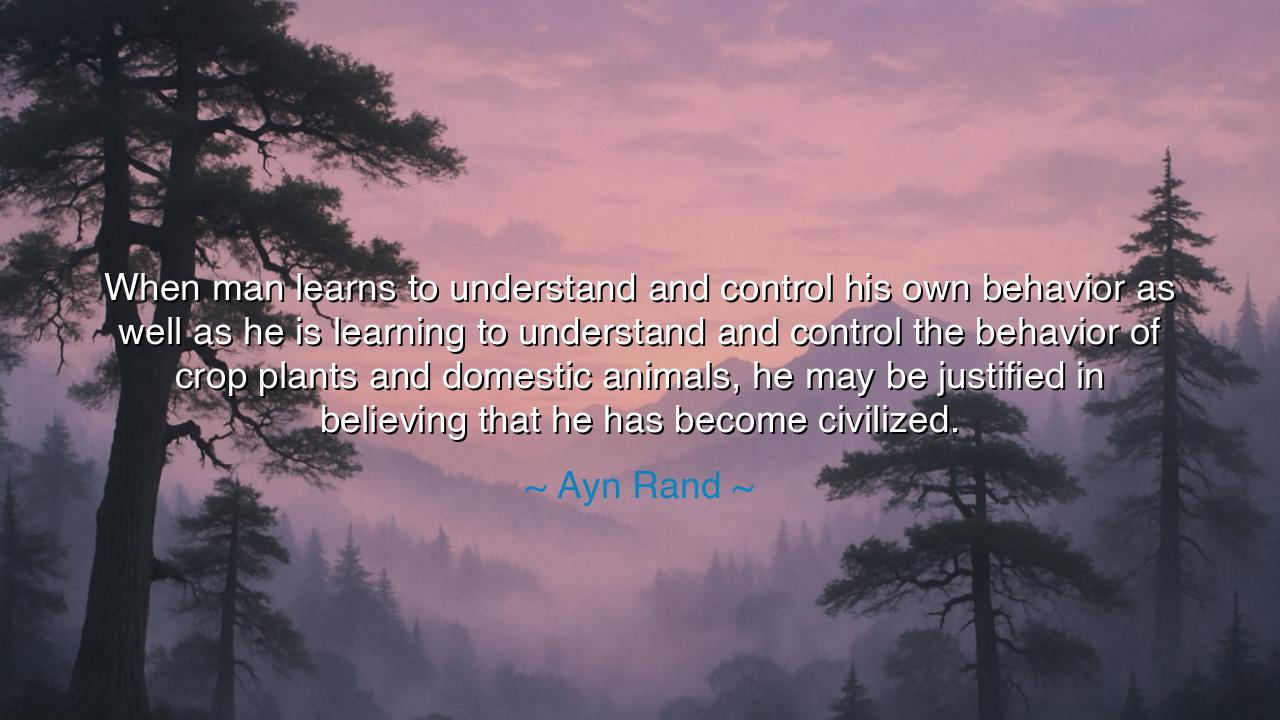
When man learns to understand and control his own behavior as
When man learns to understand and control his own behavior as well as he is learning to understand and control the behavior of crop plants and domestic animals, he may be justified in believing that he has become civilized.






“When man learns to understand and control his own behavior as well as he is learning to understand and control the behavior of crop plants and domestic animals, he may be justified in believing that he has become civilized.” – Ayn Rand
In these piercing and immortal words, Ayn Rand, the philosopher of reason and individuality, holds a mirror before the human race. She speaks not of progress in machines, nor in cities, nor in wealth, but of mastery over the self. For though humanity has bent nature to its will — taming plants for food and animals for labor and companionship — it has not yet learned to govern the wilderness within. She reminds us that true civilization is not measured by the abundance of harvests or the might of empires, but by the ability of man to understand and control his own behavior — his impulses, his desires, and the forces that move his spirit.
The origin of this insight lies in the tension between two forms of mastery: the external and the internal. Since the dawn of agriculture, mankind has learned to domesticate the earth — to sow seeds with wisdom, to breed creatures for strength and beauty, to mold the environment into harmony with human need. Yet for all this triumph, the inner world often remains chaotic. Rand saw that man, though powerful in his dominion over nature, remained a stranger to himself. He could engineer abundance, yet sow destruction through greed. He could tame beasts, yet rage like one. Her words are both a warning and a call — that the conquest of the self must rise to match the conquest of the world.
To control one’s own behavior is not to suppress life, but to refine it — to bring reason where there is instinct, and clarity where there is confusion. The beasts of the field act upon hunger, fear, and habit; but man, if he is to be more than a beast, must act upon understanding. Civilization begins not with fire or plow, but with awareness — the moment when a human being steps back and says, “I will not be ruled by impulse, but by choice.” This is the essence of maturity, of culture, of moral strength. Until a man can master his anger as he harnesses his oxen, until he can cultivate virtue as he cultivates grain, his civilization is only a façade.
History gives us countless examples of this truth. The mighty Roman Empire, which conquered lands from Britain to Egypt, fell not to the sword of the barbarian, but to its own corruption. Rome tamed nations but could not tame its greed. The people who had mastered engineering and law lost control over their appetites and power. And so the empire rotted from within, proving Rand’s wisdom centuries before her birth: that without self-mastery, progress becomes decay. The external achievements of a society cannot endure if its citizens do not cultivate the inner discipline that sustains them.
Yet there are also tales of those who embodied this higher civilization — those who sought dominion not over others, but over themselves. Consider Mahatma Gandhi, who subdued an empire not by force, but through self-restraint and principle. He mastered his anger, his body, and his will, turning inward discipline into outward strength. His revolution was not of the sword, but of the spirit — a living testament that civilization is born not from domination, but from understanding. In his calmness before violence, he proved that true power flows from inner control.
Rand’s words also reveal a deeper challenge: that to understand human behavior is to understand both light and shadow. Civilization demands not the denial of passion, but its transformation. Man must learn not only to govern his instincts, but to use them for creation, not destruction — to turn ambition into progress, love into compassion, curiosity into invention. Just as the farmer studies the soil before planting, so must the individual study his heart before acting. Knowledge of the self is the first and greatest science, for it governs all others.
So let this be the lesson, passed down like an oracle’s flame: to be civilized is to be conscious. The savage strikes without thought; the civilized pauses, reflects, and chooses. The beast follows instinct; the man of reason follows understanding. Strive, therefore, not only to cultivate the earth, but to cultivate your soul. Study your motives as a scholar studies the stars. Weed out envy and deceit as a farmer weeds his field. Plant the seeds of wisdom, water them with patience, and harvest the fruits of integrity.
For as Ayn Rand teaches, the highest civilization is not built with stone, but with self-knowledge. The towers of men may crumble, but the soul that has mastered itself stands eternal. When humanity learns to govern its passions with the same precision with which it governs its tools, then — and only then — may it truly call itself civilized.






AAdministratorAdministrator
Welcome, honored guests. Please leave a comment, we will respond soon